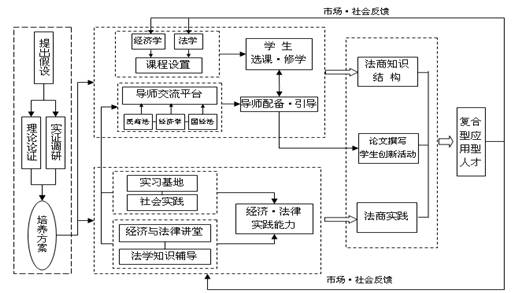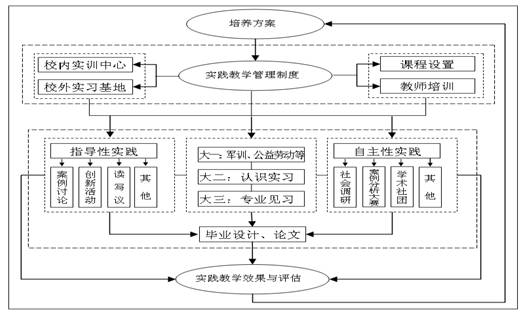The talent cultivation of the School of Economics and Management conforms to the trend of economic globalization and the internationalization of higher education. It follows the talent cultivation idea of taking social demand as the guide, ability cultivation as the core, combination of law and business as the feature, and quality improvement as the goal, follows the talent growth law and education and teaching law, and has a solid foundation of economic management knowledge and rich legal knowledge, Comprehensive and application-oriented economic management talents with strong practical ability and innovative spirit.
The talent training of the School of Economics and Management aims to improve the overall quality of students, and optimize their knowledge system, ability structure and personality quality. In terms of knowledge structure, it is required to master basic knowledge and skills in management, economics, law, financial management, finance, etc; In terms of ability structure and personality quality, improve students' social adaptability, realize the balanced development of social adaptability and professional development ability, and meet the requirements of the society for the training of economic management talents. Cultivate potential middle and senior management talents with basic professional quality who can engage in business management, planning, consulting, teaching and training for industrial and commercial enterprises, financial institutions, consulting companies, investment companies, institutions and government departments.
Training target orientation: in line with the trend of globalization, informatization and networking, we should cultivate business management talents who are application-oriented, combine law with business, have strong practical and practical abilities, have strong adaptability, and have a certain spirit of innovation. Specifically, it is to cultivate potential middle and senior management talents with basic professional quality who can engage in business management, planning, consulting, teaching and training for industrial and commercial enterprises, financial institutions, consulting companies, investment companies, institutions and government departments.
Level orientation: Our college is a newly established local undergraduate college, focusing on training application-oriented talents. For a long time to come, we will focus on strengthening undergraduate education and training management talents needed by society; On this basis, gradually prepare for graduate education.
Function orientation: teaching type. At the same time, actively enhance the scientific research function, gradually expand the internship base based on Shanghai (especially Qingpu District and Songjiang District), and carry out social service functions such as enterprise research, personnel training, industry university research project cooperation, and management consulting.
Nature orientation: multidisciplinary. Economics, management, sociology, psychology and law are integrated.
After several years of exploration, the School of Economics and Management has gradually formed its own basic ideas and professional characteristics of talent training by combining its professional positioning and giving play to its comparative advantages. The school running characteristics of the School of Economics and Management emphasize the following two aspects: first, give full play to the advantages of the school running, highlight the combination of law and business, and lay a foundation for training compound talents; The second is to implement a diversified practical teaching system, pay attention to the cultivation of students' practical ability, and lay the foundation for training application-oriented talents.
(1) The school running characteristics of combining law with business
The combination of law and business is not only the demand of the development of market economy, but also the inevitable choice to give play to the characteristics of our school and the advantages of legal research. In order to truly achieve the combination of law and business and form our school running characteristics, we have taken four measures (see Figure 1 for the specific personnel training mechanism of the combination of law and business).

Figure 1 Schematic diagram of talent training mechanism combining law and business
1. Realize the combination of law and business through curriculum
In order to integrate the teaching concept of combining law with business into students' learning, we have specially designed a course system of law modules in the elective courses of various majors, including several law courses closely combined with economic management. In the course teaching, we focus on the use of case teaching methods, simulation teaching methods and other means to achieve the deep integration of civil and commercial law, maritime law, international economic law and other law courses with business management, international finance, international trade practice and other practical courses, to achieve the organic integration of law courses and economic management courses, to form a knowledge structure of law and business, and to truly achieve the combination of law and business.
2. Achieve the combination of law and business through teachers' scientific research
The combination of teaching and learning, and the true realization of the combination of law and business, must also be supported by teachers' scientific research. For this reason, the Department of Economic Management takes the cross research direction of economic management and law -- regulatory economics and law economics as the key development direction of discipline construction, so as to fully reflect the school running characteristics of combining economics and law. Through the construction of regulatory economics and law economics, it will become a link between law, sociology, politics and economic management, and on this basis, it will build a research platform for the integration and reference of law, sociology, politics and economic management to promote the realization of the combination of law and business.
3. Realize the combination of law and business through mutual exchanges between colleges
The combination of law and business is a systematic project, which requires close cooperation between relevant departments. To this end, the University has established a tutor exchange platform among relevant colleges. When students encounter problems in the course of combining law with business, they can communicate with their tutors through the tutor exchange platform in a two-way way; Teachers can also discuss academic issues through the tutor exchange platform. The establishment of the tutor exchange platform eliminates the division between the economic management profession and the law and other professions, and provides a mechanism guarantee for the combination of law and business.
4. Realize the combination of law and business through social practice
The combination of law and business is not only a kind of teaching yearning, but also a practical demand for the development of market economy. In real economic life, there are many vivid cases of the combination of law and business. In order to enable students to understand the combination of law and business in social practice, the Department of Economic Management has carried out a number of measures, such as hearing in the court, setting up a mock court, participating in corporate social practice, and opening economic and legal lecture halls, to transform the combination of law and business from teaching yearning to social practice, and to achieve the perfect combination of the two in practice.
(2) Diversified practical teaching system
Real knowledge comes from practice. The role of social practice in training practical and skilled senior talents is self-evident. In order to strengthen practical teaching, the Department of Economic Management has created a diversified practical teaching system. The diversified practical teaching system consists of experimental training, practical practice and research. The diversified practical teaching system covers the whole process from enrollment to graduation, from classroom to after-school, and from inside to outside the hospital, forming a whole process, all-round and multi form practical teaching system (see Figure 2 for the diversified practical teaching system).

Figure 2 Schematic diagram of diversified practical teaching system
1. Classroom practical training and experimental course teaching
In the teaching of practical experimental courses, the Department of Economics and Management has established an open experimental teaching system that combines compulsory and elective courses, consisting of confirmatory, comprehensive and designed experiments, to highlight the cultivation of practical ability and innovation ability. At present, the Department of Economic Management has set up a series of training and experimental courses such as enterprise management sand table simulation training, international trade practice simulation training, foreign trade skills document training, econometrics Eviews 3.0 software operation, foreign trade correspondence, etc. The training and experimental courses under construction and to be opened include a series of courses such as accounting and financial simulation, human resource management simulation, marketing simulation, securities investment simulation, commercial bank operation and management simulation, and international settlement simulation.
The School of Economics and Management has achieved fruitful results in the teaching of practical and experimental courses. It has won the first prize in the 2007 and 2008 National Business Management Sand Table Simulation Contest, the second prize in the 2014 National Vocational College Foreign Trade Skills Competition, the second prize in the group, the second prize in the foreign trade skills document, the third prize in the individual, the personal excellence prize, and the personal excellence prize in the business English oral contest.
2. Practice activities outside the hospital
The extracurricular practice activities of the Department of Economics and Management cover the whole process from enrollment to graduation. As a freshman, he mainly engages in military training and social welfare activities to help students develop correct outlook on life and values; The sophomore is a cognitive practice to cultivate students' perceptual knowledge of social practice. The third year of college is a professional practice to cultivate students' ability to use professional knowledge. The fourth year of college is a graduation practice, which aims to cultivate and test students' ability to find, analyze and solve problems.
In order to strengthen the integration of students' theory with practice, strengthen the connection between the school and society and help students enter the society, the Department of Economic Management has established nine large-scale enterprise practice bases and signed practice business contacts with more than 20 enterprises and scientific research institutions they belong to. As of January 2015, our college has sent more than 3000 people to the practice base to participate in various forms of practical teaching activities, and sent more than 100 teachers to participate in the guidance of practical teaching.
3. After class research activities.
In order to enlighten students' academic thinking, guide students' professional learning direction and guide students to find jobs, the Department of Economics and Management has carried out a series of professional cultural activities independently or jointly with other departments, so that students can have the opportunity to experience the professional cultural atmosphere and choose their own development direction in the professional cultural atmosphere.
Since 2005, students of the School of Economics and Management have participated in 20 Youth League projects, 18 teacher research projects, 40 college student innovation projects and 12 essay contests. The Joint Scientific Research Office of the School of Economics and Management and the editorial department of the journal held seven May 4th Paper Contests, which received more than 600 papers, and collected and printed the winning papers into a collection of essays. Through this series of activities, students' interest in scientific research and scientific research ability have been significantly improved, and 35 papers have been published.